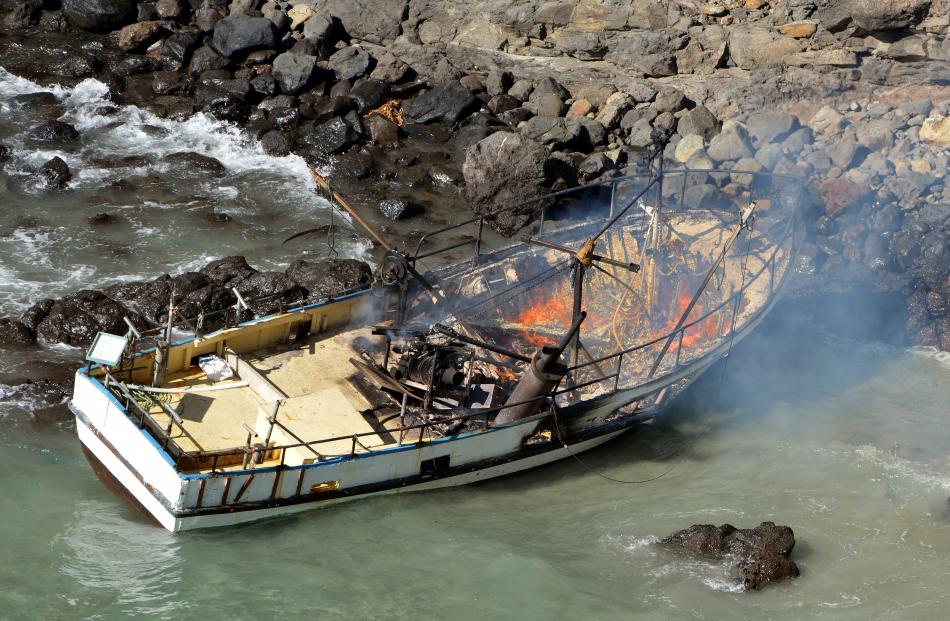Communications failures led to ''major'' mistakes in the operation to rescue a Dunedin fisherman whose boat was engulfed by flames, a debriefing has found.
Port Chalmers recreational fisherman and marine search and rescue adviser Warren Lewis was forced to run his burning boat aground in an isolated bay near Heyward Point in September last year.
He was eventually winched to safety by the Otago Regional Rescue Helicopter, suffering from cold and smoke inhalation, more than an hour later.
Police initially denied making mistakes during the rescue, despite criticism at the time, but documents released to the Otago Daily Times following a police-led debriefing outlined a series of failures.
That included initially telling the rescue helicopter to head to the wrong location, further south in the Catlins, and then sending it back to base when Mr Lewis was still stranded on the rocky beach waiting for rescue.
Police also failed to notify Coastguard Dunedin about the developing incident to begin with, leading to a delay in its response, the documents showed.
The mistakes were described as ''major errors'' by Senior Sergeant Brian Benn, the police southern district SAR co-ordinator, in an email to other senior police following the operation.
Yesterday, he stood by the comment, saying the problems stemmed from a communications breakdown between would-be rescuers and police staff co-ordinating the response from Christchurch.
''It wasn't the perfect operation, that was for sure, but I don't think I've ever run the perfect operation.
''It's just the nature of the beast,'' he said.
Mr Lewis, contacted at home, said he remained ''extremely concerned'' by the way the rescue had unfolded, and the outcome could have been much worse.
It was a point emphasised by a Fire Service representative during the debriefing, who told participants they were ''fortunate we are discussing a debrief and not appearing in a coroner's court'', Mr Lewis said.
''I think that was a very telling comment.
''All indications are that police comms [communications] in Christchurch failed miserably in co-ordinating or handing over the search to Dunedin rescue organisations.''
The debriefing documents showed Mr Lewis' initial radio distress call was picked up at Port Otago's harbour control and relayed to police communications staff, co-ordinating the response from Christchurch, at 11.54am.
The rescue helicopter was initially told to head to Haywards Point, in the Catlins, before the location was corrected to Heyward Point, just north of Otago Harbour, eight minutes later.
Then, when reports came in that Mr Lewis had made it to shore and was safe, the helicopter was stood down at 12.09pm.
At 12.57pm, the helicopter was sent again, after it became clear Mr Lewis could be reached only by air or sea. He was finally winched aboard at 1.16pm.
Snr Sgt Benn told the ODT the mistakes turned out not to be ''as important as [they] could have been on another job, where there was a rescue still to be carried out''.
He did not want to be ''overly critical'' of police communications staff, but mistakes had been made, in part due to reliance on ''third-hand'' information.
That included believing Mr Lewis was safe when he made it to shore, when in fact he was injured and ''in a very remote location''.
''He wasn't actually in a safe place at that stage,'' Snr Sgt Benn said.
In total, the debrief had identified 10 areas for improvement. Most had already been acted upon, Snr Sgt Benn said.
That included ensuring incident locations were checked with the Rescue Co-ordination Centre New Zealand, which ''would have told them, right there and then, and this job is over here, rather than over there'', he said.
Police communications staff had also been reminded it was ''best practice'' not to stand a rescue helicopter down too soon, he said.
''We certainly reinforced that. That should never happen.''
Snr Sgt Benn said his new role overseeing the southern district meant he was not directly involved in Mr Lewis' rescue, but he had taken part in the debriefing that followed.
The most significant errors had occurred early in the incident, before Dunedin rescuers became involved, he believed.
''Probably the only thing [Dunedin rescuers] did wrong was talk too much [on the radio].
''But that's a whole lot of enthusiastic people trying to help Warren,'' Snr Sgt Benn said.














